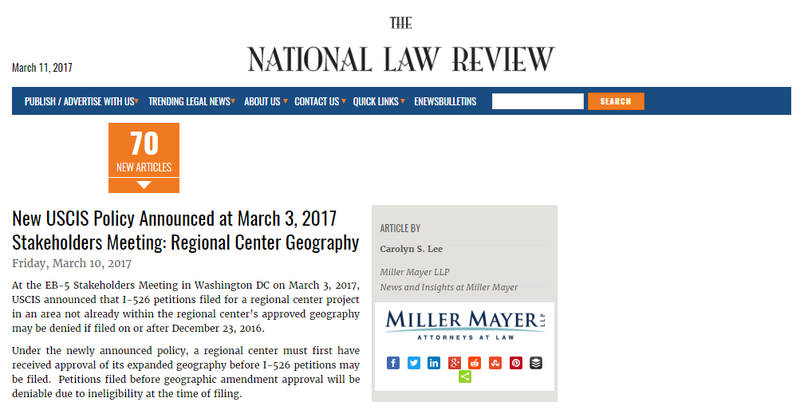New USCIS Policy Announced at March 3, 2017 Stakeholders Meeting: Regional Center Geography
At the EB-5 Stakeholders Meeting in Washington DC on March 3, 2017, USCIS announced that I-526 petitions filed for a regional center project in an area not already within the regional center’s approved geography may be denied if filed on or after December 23, 2016.
Under the newly announced policy, a regional center must first have received approval of its expanded geography before I-526 petitions may be filed. Petitions filed before geographic amendment approval will be deniable due to ineligibility at the time of filing.
The announced policy reverses the policy in the May 30, 2013 USCIS EB-5 Policy Memorandum which states that “formal amendments to the regional center designation, however, are not required when a regional center changes its industries of focus, its geographic boundaries, its business plans, or its economic methodologies” (emphasis added). Notwithstanding, investor petitions filed in reliance upon this written guidance are now subject to denial if filed after December 23, 2016.
Why did USCIS use December 23, 2016 as the effective date for this new policy? According to Investor Program Office (IPO) officials present at the March 3 meeting, the instructions to new Form I-924 which became effective on December 23, 2016 should have alerted stakeholders of the change. However, stakeholder surprise and dismay at the March 3 meeting indicate that a policy change announced by instructions on a form is insufficient notice for a full reversal of prior policy by memorandum.
Changes typically made in new form instructions include filing fee increases, filing place address changes, and changes in filing procedure of like scale. It stretches reasonable expectation to assume stakeholders will analyze new form instructions for major policy shifts. Indeed, a form instruction that directly contravenes final written authority, such as the May 2013 Policy Memorandum, cannot sensibly be expected to provide notice of policy change. Moreover, while the instructions state that an amendment must be filed to “change the geographic area of a regional center,” the instructions do not also state that associated I-526 petitions must wait until such an amendment is approved. Neither is this requirement stated in the instructions to the new Form I-526, also made effective on December 23, 2016.
USCIS may change its policy consistent with applicable authority. However, it must do so transparently. The integrity of EB-5 adjudication is compromised when USCIS changes its policy without notice and applies those changes retroactively, as it has done here. Past examples of retroactive policy changes include denials based on findings of “indebtedness,” “tenant occupancy,” and “material change.” Unfortunately, we now add “unapproved geography” to the list. Hearing stakeholder feedback, USCIS will hopefully either revert to prior policy or at least rescind the December 23, 2016 effective date for a prospective one.
Mentions
States
- New York
Securities Disclaimer
This website is for informational purposes only and does not constitute an offer or solicitation to sell shares or securities. Any such offer or solicitation will be made only by means of an investment's confidential Offering Memorandum and in accordance with the terms of all applicable securities and other laws. This website does not constitute or form part of, and should not be construed as, any offer for sale or subscription of, or any invitation to offer to buy or subscribe for, any securities, nor should it or any part of it form the basis of, or be relied on in any connection with, any contract or commitment whatsoever. EB5Projects.com LLC and its affiliates expressly disclaim any and all responsibility for any direct or consequential loss or damage of any kind whatsoever arising directly or indirectly from: (i) reliance on any information contained in the website, (ii) any error, omission or inaccuracy in any such information or (iii) any action resulting therefrom.




